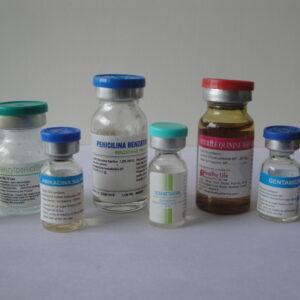Description
Vancomycin HCl injection
Vancomycin is an antibiotic used to treat various bacterial infections. The inclusion of “eq to Vancomycin 1000 mg” means that the amount of Vancomycin Hydrochloride present is equivalent to 1000 mg of pure Vancomycin. This equivalency is important for ensuring accurate dosing and administration of the antibiotic. Always follow the instructions provided by healthcare professionals or on the product label for proper use and dosage.
It seems like you’re describing a vial of Vancomycin Hydrochloride (HCl) injection. The information provided indicates that each vial contains Vancomycin Hydrochloride, with an equivalence to 1000 mg of Vancomycin. This suggests that the Vancomycin HCl in the vial is in a quantity such that it is equivalent to 1000 mg of pure Vancomycin.
Vancomycin is an antibiotic used to treat various bacterial infections. The Hydrochloride (HCl) form is a common salt form of the drug. The dosage and administration of Vancomycin should always be done under the guidance of a healthcare professional, as they will determine the appropriate dosage based on the specific condition being treated and the patient’s individual factors.
It seems like you’re describing a vial containing Vancomycin Hydrochloride (HCl) with an equivalent amount of Vancomycin at 1000 mg. Vancomycin is an antibiotic used to treat bacterial infections, particularly those caused by methicillin-resistant Staphylococcus aureus (MRSA) and other resistant bacteria.
The notation “Vancomycin HCl IP eq to Vancomycin 1000 mg injection” indicates that the Vancomycin Hydrochloride in the vial is equivalent to 1000 mg of pure Vancomycin. This equivalence is often stated because the salt form (HCl) contributes to the overall weight, but the active ingredient is the Vancomycin itself.
Before using or administering any medication, it’s crucial to follow the prescribed dosage and administration guidelines provided by a healthcare professional. If you have any concerns or questions about this medication, it’s best to consult with your healthcare provider or pharmacist for personalized advice.
The usage of Vancomycin 1000 mg injection would depend on the specific medical condition being treated, the severity of the infection, and the patient’s individual factors such as weight, age, and overall health. Vancomycin is an antibiotic commonly used to treat serious bacterial infections, including those caused by methicillin-resistant Staphylococcus aureus (MRSA) and other susceptible bacteria.
Typically, healthcare professionals, such as doctors or nurses, administer Vancomycin injections. The dosage and frequency of administration will be determined by the prescribing healthcare provider based on factors such as the type and location of the infection, the patient’s weight, and kidney function.
It’s crucial to follow the prescribed dosage and administration instructions provided by the healthcare professional. It’s not advisable to self-administer antibiotics or adjust the dosage without consulting a healthcare provider, as improper use may lead to ineffective treatment, development of resistance, or potential side effects.
If you have a specific prescription or if you are unsure about the usage of Vancomycin 1000 mg injection, please consult with your healthcare provider or pharmacist for personalized guidance based on your medical history and condition.
Vancomycin is a potent antibiotic typically used to treat severe infections caused by Gram-positive bacteria, including methicillin-resistant Staphylococcus aureus (MRSA) and other antibiotic-resistant strains. It’s commonly administered intravenously due to its poor oral absorption.
The usage of Vancomycin 1000 mg injection would depend on several factors, including the type and severity of the infection, the patient’s age, weight, renal function, and other medical conditions they may have. Dosage and administration should always be determined by a qualified healthcare professional.
Typically, Vancomycin dosing is based on body weight and renal function, and it’s often administered multiple times a day. The dosage regimen may also vary based on the specific indication for which it’s being used (e.g., skin and soft tissue infections, bloodstream infections, endocarditis, etc.).
It’s essential to follow the healthcare provider’s instructions carefully and complete the full course of treatment, even if symptoms improve before the medication is finished. Failure to do so could result in the development of antibiotic resistance or incomplete eradication of the infection.
Additionally, Vancomycin usage requires monitoring of serum drug levels, especially in patients with renal impairment, to ensure therapeutic efficacy and avoid toxicity. This monitoring helps adjust the dosage as needed to maintain therapeutic levels while minimizing the risk of adverse effects.
As with any medication, it’s crucial to discuss any concerns or questions about Vancomycin usage with a healthcare professional, who can provide personalized guidance based on the individual’s medical history and circumstances.
Vancomycin is an antibiotic used to treat a variety of bacterial infections. The dosage and administration of Vancomycin can vary depending on the specific infection being treated, the patient’s weight, renal function, and other factors. The information provided, “Vancomycin HCl IP eq to Vancomycin 1000 mg injection,” indicates that each vial contains Vancomycin Hydrochloride (HCl) equivalent to 1000 mg of Vancomycin.
The usage and administration of Vancomycin are typically determined by a healthcare professional, such as a doctor or pharmacist. It is usually administered intravenously (IV) in a healthcare setting, and the dosage and frequency are tailored to the specific needs of the patient and the nature of the infection.
It’s important to follow the healthcare provider’s instructions precisely and to complete the full course of treatment, even if symptoms improve before the medication is finished. Additionally, if you have any specific questions about the usage of Vancomycin or if you are experiencing any side effects, it’s essential to consult with your healthcare provider for personalized advice.



